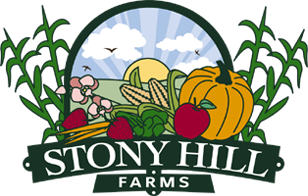Growing Practices
Stony Hill is farming for the future
Home > Farm Market > Growing Practices
Sustainable Farming
In today’s consumer market, there are so many different “correct” ways to grow the food we eat. At Stony Hill Farms, we are constantly seeking the best ways to grow our food with the least amount of negative impacts on the environment. That’s why we choose to coin our produce “sustainably grown.”
So what is sustainably grown produce?
We implement Integrated Pest Management (IPM) that focuses on preventive methods through monitoring and controls that offer opportunities to eliminate or significantly reduce our use of pesticides, which also minimizes consumer exposure to such pesticides or likened products that are used. Removing the use of pesticides promotes a variety of preventive methods and techniques, such as cultural, physical, mechanical. biographical, and structural strategies to control pest problems.
Our primary goal with IPM is pest prevention. IPM is an effective and environmentally sensitive approach to pest management; not just a single pest control method but rather a series of pest management evaluations. The essentials towards utilizing an IPM program are monitoring, record-keeping, and evaluation.
When monitoring, sites should be regularly inspected, and traps should be maintained to determine the types of infestations as well as pest levels at each site. Not all insects, weeds, and living organisms require control and oftentimes are innocuous and even occasionally beneficial to our operations. When we use IPM, we identify and isolate the pests that require appropriate control decisions and implement action thresholds. Monitoring and identification remove the possibility that pesticides are unnecessarily used or introduced at all.
Record keeping is crucial to establish trends from these monitoring visits and helps to ascertain patterns in pest outbreaks. Such information recorded should include the pest identified, population size, distribution, and the recommended preventative measures moving forward as well as treatment actions put into effect. Since pests are never fully eradicated, action levels should be put into place. Action levels are the predetermined population sizes that require remedial action before yield loss. Regular evaluations are essential towards determining the success of whichever strategies are being utilized. When working with IPM, chemicals should only be used as a last resort if a crop is in jeopardy of loss or failure to a pest or disease. If pesticides are to be used, the least-toxic materials will be chosen and applied for minimal exposure to humans and the environment.
Preventative controls can be very effective and cost-efficient, while presenting little to no risk to the people or the environment. Cultural methods like crop rotation, using pest-resistant varieties, and planting pest-free rootstock are all viable prevention control methods. Less risky, highly targeted chemicals like pheromones used to disrupt pest mating and physical methods such as trapping and weeding are also effective methods. Biological controls include the introduction of predator insects like adult lady beetles and their larvae, which feed on aphids, mealybugs, whiteflies, mites, and thrips. If further monitoring indicates that these less risky methods are not working, additional pest control methods would be employed, such as the targeted spraying of pesticides Generalized, large scale spraying of non-specific pesticides is an absolute last resort.
How do you know if the food you buy is grown using IPM?
Food grown using IPM methods is not clearly labeled like a certified organic product would be. There is no national certification implemented for growers using IPM like there is for organic growers by the USDA. Since IPM is such a complex and versatile pest control process, it is impossible to create one standard definition for foods grown under these practices. The best way to know is to ask! We would be happy to talk to you about our IPM practices and what it means for the produce we grow for your family’s table.

